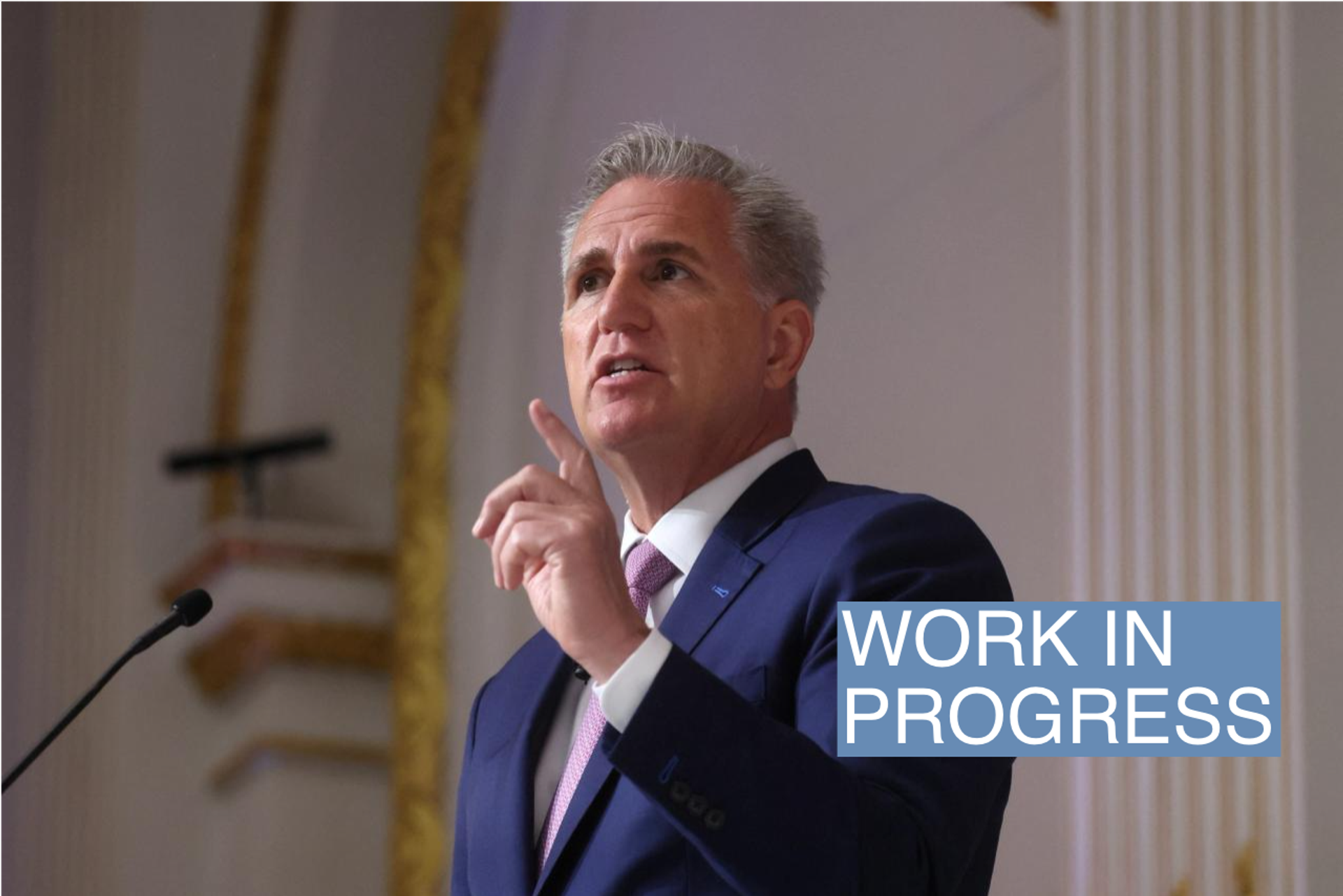The News
House Republicans promised to roll out their debt ceiling proposal on Tuesday. By the day’s end, it still hadn’t quite unfurled.
Speaker Kevin McCarthy sketched out the broad details of his plan to GOP lawmakers during a closed-door morning meeting. But basic details of the package are still being workshopped, with hardline conservatives pushing to include sweeping demands like a repeal of President Joe Biden’s signature climate and tax bill.
In this article:
Joseph’s view
Republicans said they were hoping to bring their legislation to the floor some time next week. But with no firm proposal in writing, it remains unclear if leaders can finalize and pass a bill in such a short time.
“We still have to resolve major questions like the dollar amount, and the duration, and the policy concessions we are seeking from the Senate. So it couldn’t possibly have 218 votes because it doesn’t even exist,” Rep. Matt Gaetz of Florida told reporters.
Moving a party-line debt ceiling package is a critical test for House Republicans, who need to show they can pass their own bill before trying to negotiate a deal with the Biden administration. And time is ticking: On Tuesday, Goldman Sachs published a note saying the U.S. could reach its drop dead date on the debt limit in June, sooner than originally expected, due to weaker than anticipated tax collections.
The proposal McCarthy outlined would raise the nation’s borrowing cap through some time in 2024 in exchange for trimming non-defense discretionary spending by $130 billion and capping its growth at 1% per year for a decade. It would also claw back unused COVID emergency funds, officially end Biden’s student debt cancellation plan (which already seems to be in trouble at the Supreme Court), and impose work requirements on some safety net programs.
But Republicans have yet to agree on whether to raise the borrowing limit for a full year, or by a fixed dollar amount that could run out sooner. They are also split on whether Medicaid beneficiaries, food stamp recipients, or both should be subject to more work requirements.
Meanwhile, McCarthy is facing pressure from his right flank to use the debt ceiling standoff to try and repeal large portions of the Inflation Reduction Act, the major climate, health, and tax law that Biden signed last year.
Know More
House Freedom Caucus Chair Scott Perry, R-Pa. and Texas Rep. Chip Roy initially said they thought Republicans should try to scrap the entire Inflation Reduction Act, which includes popular provisions allowing the government to negotiate prescription drug prices. “There are a handful of folks in our conference who get a little wobbly. It always happens,” Roy told conservative radio host Glenn Beck. “We’re having to hold the line.”
Later in the day, however, they dialed back their demands a bit, saying they wanted to scrap its climate spending and influx of funding for the IRS.
Some moderates who won in Biden districts appeared squeamish about the conservatives’ demands. “I think [McCarthy] prefers a simple clean bill that’s easy to articulate to the voters,” Nebraska Rep. Don Bacon told reporters, adding that other members wanted to “make it more complicated.”
Asked by Semafor if conservatives are worried that seeking IRA repeal will lose support from GOP moderates, Georgia Rep. Buddy Carter replied: “Obviously.”
Though repealing the Biden’s IRS funding has become a popular cause among conservatives, it could also complicate the GOP’s message on the debt ceiling, since Capitol Hill’s nonpartisan scorekeeper projects it will increase the deficit.
At least some Republicans also seem to be worried that asking Biden to repeal large chunks of his domestic agenda would be an unproductive nonstarter in negotiations with Democrats, who have said they want a debt limit increase without any conditions.
“I think it’s just a matter of how we best work with the President and the Senate,” Kansas Rep. Ron Estes, who sits on House Ways and Means, told Semafor. “What kind of foot do we want to put forward?
There was a kernel of good news for McCarthy on Tuesday, however. At least one Republican who was previously a hard-no on raising the debt ceiling under any circumstances was reconsidering his position after McCarthy’s pitch.
“Speaker McCarthy kept his word so far on what he said he’d put in there,” Tennessee Rep. Tim Burchett told Semafor. “It’s fiscally responsible. It’s moving in the direction that I like but I’m not there yet.”
Room for Disagreement
Some key Republicans are expressing confidence that their party will reach an agreement. “We’re gonna get to 218 on a set of terms and I think we’re very close,” House Budget chair Jodey Arrington told Semafor.
